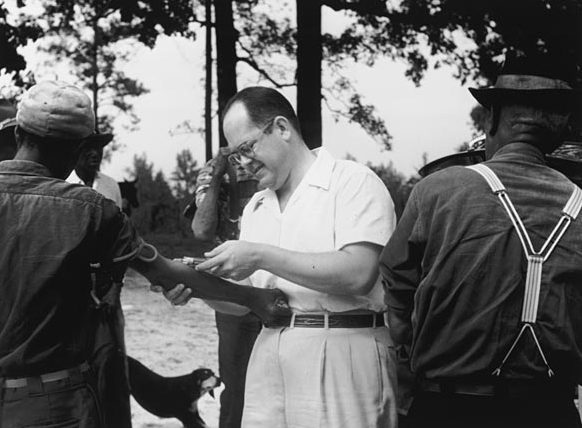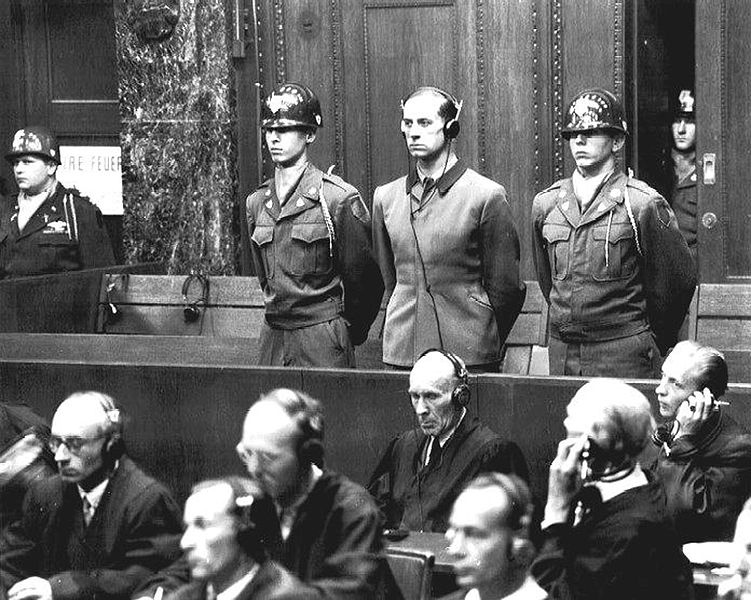On September 13, 2011, the Presidential Commission for the Study of Bioethical Issues released its report on the syphilis experiments that were funded and conducted by the US government in Guatemala in the 1940s. Over 1300 prisoners, prostitutes, psychiatric patients, and soldiers in Guatemala were infected with sexually transmissible diseases (through supervised sexual relations among other methods), in an attempt to better understand treatments for diseases such as syphilis. The researchers also drew blood from thousands of Guatemalan children to further another aspect of the study.
The Guatemala case has close links to the notorious Tuskegee syphilis study, which withheld treatment for syphilis from some four hundred black men in Macon County, Alabama, between the 1930s and the 1970s for similar reasons. Though the Tuskegee experiment had its roots in a treatment program begun in the optimistic 1920s, the depression transformed it into a study that would end only after negative publicity in the early 1970s. In Alabama, there was no deliberate attempt to infect the subjects of the study. In Guatemala treatment was the norm, but subjects were deliberately infected. In neither case were the risks, or indeed the aim, of the studies fully explained to those who participated. Indeed, the Commission’s report explicitly notes the “deliberate efforts to deceive experimental subjects and the wider community that might have objected to the work.” In Alabama the men in the study were led to believe they were being treated for what the doctors routinely called ‘bad blood.’
 Both experiments were underway before the widespread adoption of the ethics code hammered out after the Nüremberg trials, the so-called ‘doctors’ trial’ of Nazi war criminals, but the code did not put an end to the Tuskegee study. There is a long history, and not just in the US, of using people without power – those considered ‘inferior,’ those in disciplinary regimes such as prisons or the military, and those regarded as less likely to protest or even to comprehend – as human subjects in medical and scientific experiments. Indeed, experiments very similar to the Guatemalan one (without the supervised sex) were carried out in the federal prison at Terre Haute, Indiana in the early 1940s and again at Sing Sing in New York in the 1950s.
Both experiments were underway before the widespread adoption of the ethics code hammered out after the Nüremberg trials, the so-called ‘doctors’ trial’ of Nazi war criminals, but the code did not put an end to the Tuskegee study. There is a long history, and not just in the US, of using people without power – those considered ‘inferior,’ those in disciplinary regimes such as prisons or the military, and those regarded as less likely to protest or even to comprehend – as human subjects in medical and scientific experiments. Indeed, experiments very similar to the Guatemalan one (without the supervised sex) were carried out in the federal prison at Terre Haute, Indiana in the early 1940s and again at Sing Sing in New York in the 1950s.
In Guatemala and in Alabama, the idea of racial difference played a significant role in determining the shape of the studies. Scientists debated whether there were racial differences in sexually transmissible diseases. Prejudices that saw some populations as more sexual than others fuelled such ideas. The theory that syphilis may have originated in Central America made some scientists wonder if the indigenous population had thus acquired immunity. Ideas such as these made already under-privileged populations targets for invasive research.
 President Obama issued an apology to Guatemala in 2010 for the actions of government officials. President Clinton issued an apology to the subjects of the Tuskegee study in 1997.
President Obama issued an apology to Guatemala in 2010 for the actions of government officials. President Clinton issued an apology to the subjects of the Tuskegee study in 1997.
Do studies like this go on today here or elsewhere? In theory, the answer is “no,” since there are rules in place that require scientists and doctors to explain their work to subjects and because some techniques simply aren’t allowed any longer. In practice, the situation is more complex. The Guatemala research came to light only when a researcher stumbled across evidence in the papers of the lead scientist. Tuskegee was never a secret; throughout the years of the study, leading science journals openly published its results. For the historian, all this is familiar territory: the accidental unearthing of evidence, the evidence hidden in plain sight. Students often ask me: how could this have happened? How could this have been allowed? There are good lessons to learn here, and ones in which historians can play a crucial role. While it’s too late for the Guatemalan prisoners of the 1940s and the men of Tuskegee, it has nonetheless often been the work of historians that has either uncovered or kept in the public eye actions that might otherwise go unnoticed and unremarked. Better late than never.
In Spring Semester 2012, Prof. Levine will debut a course entitled “Science, Ethics and Society.”
Government documents and Media Coverage on the experiments:
http://bioethics.gov/cms/node/306
http://www.examiningtuskegee.com/
http://www.cdc.gov/tuskegee/timeline.htm
http://www.hsl.virginia.edu/historical/medical_history/bad_blood/report.cfm
http://www.thehastingscenter.org/Bioethicsforum/Post.aspx?id=5544&blogid=140
Books on the Tuskegee Experiments:
James H. Jones, Bad Blood: The Tuskegee Syphilis Study
Susan M. Reverby, Examining Tuskegee: The Infamous Syphilis Study and Its Legacy
Allan M Brandt, No Magic Bullet: A Social History of Venereal Disease in the United States since 1880
Photo Credits:
Doctor injecting subject, Tuskegee Syphilis Study, US National Archives and Records Administration, via Wikimedia Commons
Nuremberg Trials, Karl Brandt, Reich Commissar for Health and Sanitation, was indicted with 22 other Nazi doctors and SS officers on war crimes charges, including horrific medical experiments on concentration camp prisoners. US Army. Photo No. OMT-I-D-144. Telford Taylor Papers, Arthur W. Diamond Law Library, Columbia University Law School



